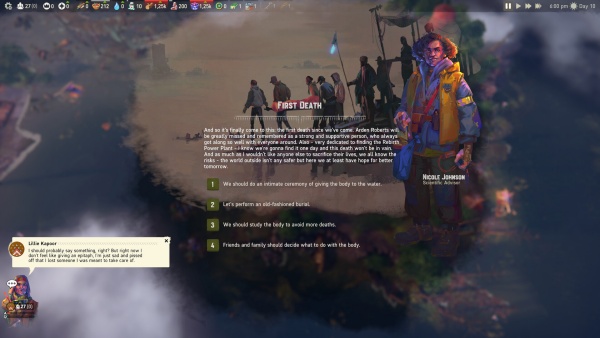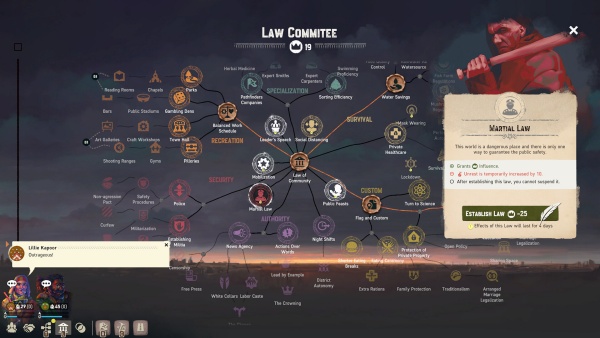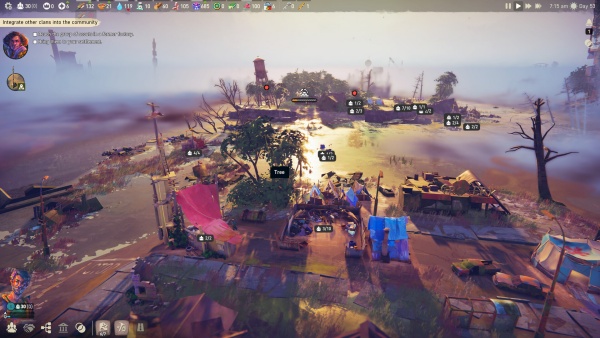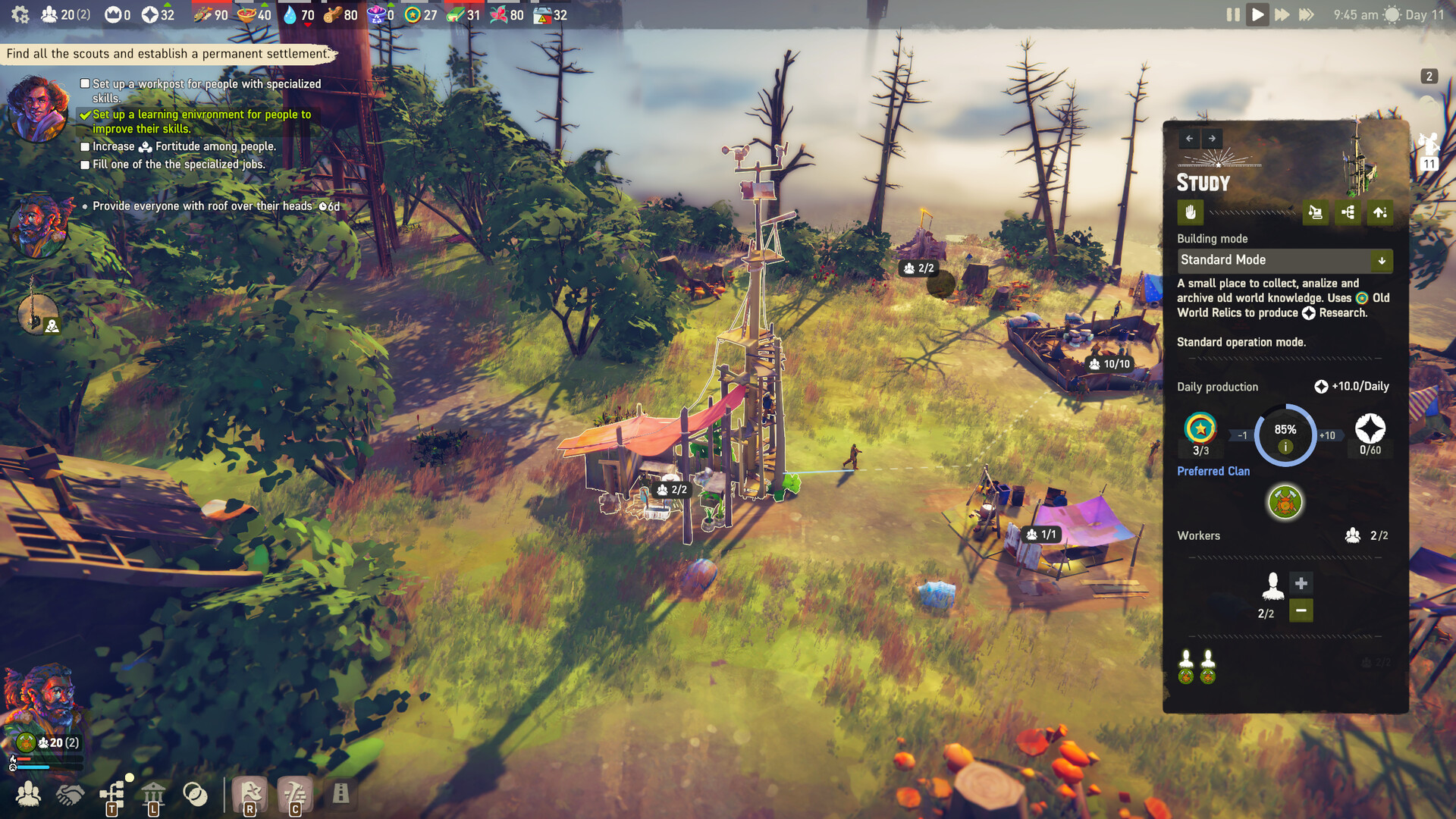Across gaming media, the topic of the environment has been a subject of thematic dramatics and engaging storytelling. Right back to 1999 when Dino Crisis’ plot revolved around research to create a new, cleaner energy which resulted in dinosaurs and time rips. But there are those games which take a more grounded (or not so grounded in this case) approach to the disaster at hand. Floodland, is a game centre on the aftermath of Global Warming, where players are tasked with rebuilding society through some more dangerous challenges than the rising water.
But does Floodland offer an engaging end-of-world experience and one which will stand the test of time? Read on.
What is Floodlands?
Floodland takes players into a world in watery ruins after the final toll of Global Warming. Cities were flooded, homes destroyed and much of dry land became submerged by water, with the remains of humanity struggling to survive day by day. Players are given the ultimate responsibility of leading a small clan of survivors to rebuild society on what remains of dry land, by scavenging for supplies, building shelters and other infrastructures, and searching for other survivors to expand the hopeful community. You will develop your understanding of raw materials, educate survivors into greater crafts, and develop a fully working society with medicine, education, care and social order.
Of course, there are many hardships, with the rising tides of the water, but more importantly providing a stable supply of food, clean drinking water, aid and of course stability in the community.
Other factors present a problem too, being a lack of raw materials and resources, along with deadly diseases which can easily wipe out a town if not properly contained. Floodlands is a game about enduring hardships and keeping hope in one’s heart. It’s a game with a very mellow outset, with a very pretty, simplistic art style and aesthetics which generally invoke a calming sensation, despite the many challenges it present.
Rebuilding the world in the way that suits you
These types of games usually appear quite intimidating and daunting, especially to those worried about spikes in difficulty and not being able to recover. It is true the intended journey for Floodland is one filled with peril and plenty of difficult choices. However, the developers have added multiple settings allowing for flexibility and accessibility. The core gameplay can be altered to be as punishing or forgiving as you want it to be, where you can experience a seamless journey of rebuilding the world with ease and comfort or be part of a gruelling and grounded reality check where even the smallest poor decision will cost dearly.
Floodlands offers players the chance to tweak various components of the game, from reducing or increasing the ease of obtaining resources, how quickly the incline of crime will be or how devastating a plague can be on the community. For those looking for a journey where they can be creatively fluent and free of worries related to food, clean water, maintaining social order and ridding disease, then rest assured, you can simply take part in the story alone.
But the veterans of the survival and world-building genres will surely want to ramp up the sliders and embark on the venture where hardship, quick thinking and strong leadership will reap the most immense rewards.
I love how flexible Floodlands was with its difficulty, allowing me and others to create the experience based on preferences and strengths. I do well with these types of games, but often enough I’m a fierce creative type who wants nothing more than to build for my community, whether it be schools, hospitals or homes. I was allowed to gather the resources I required as often as I liked, with a slight adjustment of the resource management slider, but decided to impose a tougher stance when it came to crime and social order. In the end, I created a world where stability and lawlessness were on a thin line, yet I could build with ease and make a community worth fighting for.
Floodland on even medium difficulty can still pose some extremely tough times if you’re not careful. But if you truly want a story-like journey, then there are the easiest of modes, just for that. There is plenty of flexibility here whether you’re a survivalist or just a humble leader who wants the best for their community.
A world in need, and a world worth saving
Starting the venture off, players are given the chance to decide on what type of clan they wish build with. There are 4 main clans, ranging from Fire Brigade, Good Neighbours, Oakhill Survivors and Berkut-3, with each of them posing various strengths and weaknesses when it comes to rebuilding society.
Berkut-3 are former oil drillers, and thus their science skills and exploration are impeccable, while Fire Brigade manage crime reduction a lot more effectively while being resilient during pandemics. Then we have Oakhill Survivors who consume less and encourage faster walking in theirs and other clans (yep, a thing) and Good Neighbours are resounding workaholics even during the toughest of times. All four clans each have their own benefits in a world of ruin, and all their strengths will come into play one way or the other. Starting off with a very important choice like this is a great way to set up how intense and thought-provoking the game will be, and indeed Floodland is very much so.
As you begin the chore list is straightforward and simple, gathering food, building tents and gaining access to clean water. But soon enough the demands increase, with players being tasked to go forth and search for other survivors, and build fishing ports, along with kitchens and storage facilities to safely store and cook raw meat. All these facilities will need assigned workers and its up to you to do so. Carefully thinking of numbers and people power in each sector, provides a delicate and captivating balancing act.
It’s all the same starting points and progression you’ve seen before in these world-building games, but Floodland does an excellent job at expanding the search far and wide, including plenty of risks and best of all, a progression system that has a great level of depth and choice. The Knowledge Trees covering Survival, Growth, Exploration and Well-Being are detailed and varied, with many new things to learn and use. As you expand and discover, various technological advancements and upgrades will become known, allowing you to build a more advanced infrastructure with factories and roads.
You will learn about various components and new building materials, thus opening more blueprints for larger living quarters, bigger storage containers, and medical facilities that will nurse the sick back to health. Progress and learning are incredibly important in Floodland as you are quite literally building back society. And this approach to discovery and building was very engaging and kept me wanting to discover and build more.

While food and water are vital, knowledge is power, and by learning and expanding your understanding of the world around you, will your community truly evolve. It's incredibly meaningful and gives you the feeling of advancing as a community.
The only thing to halt me from time to time was requiring the currency, or knowledge tokens to learn and develop new technologies and understandings. I would be stumped as the game asked me to unlock more types of buildings, yet my tokens gathered quite slowly. You do get tokens through exploring the world, and completing main missions, but much of the exploration outside the starting area requires a lot of resources, time and care, above all being very risky. You can indeed build an area of study and generate this token type, but they require yet another form of tokens to allow the process to happen, and these were extremely rare to find in my playthrough.
The path of knowledge also comes under fire when you have an instance of a pandemic overwhelming the community, and these can last a fair while if things get out of hand (and they can quite easily even on medium difficulty). But aside from these few instances, I found the progression and unlocking of new structures to be paced well enough. The number of new structures to research, develop and build was impressive, and with enough time playing, I could finally build my ultimate city that rose from the ruins of the old world.
Going forth into the open world and scouting is required, with the mystery of the unknown keeping me edging through the fog as much as possible. The world is massive and littered with all manner of old factories, mansions and other decaying remnants of society, filled to the brim with important resources. These resources allow me to create a safe and thriving community, but also to help find others in need of help.
Finding other people, and other clans is a neat dynamic, as each clan has their own world views, whether it’s based on Traditional Values, Unity, a creating a better New World, there are principles and ideologies players must consider when clans join forces. The balance of friend or foe is a delicate one, but if managed right, the community will be ever stronger, as the strengths of the two clans will unite and make a smoother venture towards a new world. But it can go the complete opposite, and while at times it was difficult to understand what cause any upset, I found this system to be utterly enthralling and a neat twist, rather than simply having you and everyone else being hostile, like in so many other games.
Keep the peace, heal the sick and feed the hungry
Floodland is a journey about rebuilding, looking after others and expanding your community and knowledge. You will start off small, but soon enough with the right people and understanding of various technologies and raw materials, will develop new types of facilities allowing you to heal the sick, feed the hungry and provide shelter.
Building your ideal community is one that gives plenty of freedom, allowing you to create what you see fit for your community, but also the essentials. Providing for my community’s needs was both exhausting and highly rewarding, as I tackled multiple issues coming into play, and when I struck that solution and managed to avert disaster, did I feel true accomplishment.
Players will be able to build several different shelters, storage places, kitchens, fishing ports, medical centres and much more to ensure the community is thriving and alive. You need to manage and ensure places of work, rest and gathering of resources are close together, as workers travelling long distances between work and home, will become tired, and restless and eventually turn against you. Making sure I planned out my placements of buildings become second nature after a couple of bumpy hours, but Floodland always informs you when something is wrong, and gives ample time to resolve any problems (I did try the hardest difficulty, and you’re pretty much on your own and having to judge these problems yourself. Which is great for those looking for the ultimate challenge).
But I really liked all these small details, and it made me a better carer and leader, thinking about the needs of the many, rather than simply winning a game.
The exploration, while highly risky felt so rewarding, and when I searched an old building and found people and resources, it gave me a massive boost of relief and joy, the likes which very few games have done so in recent years. It is a game of balance and patience, as rushing forward or overbuilding can be utterly damaging. Floodland has a forgiving nature, but when things do go sour, it's difficult to get them back to the way things were. Clans fighting is a big problem, and as mentioned before, in some instances I never knew what to do.
This was the big problem for me in Floodland, as guidance is there, but many of the smaller details are missing and thus, you won’t be 100% in the know on what to do. This is particularly felt in the opening hours, where the main tutorial gives a little too much freedom and you can easily use resources on other things and not the main tasks. But it can’t be helped as it is easy to get lost at times as the game fails to direct you completely on how to use a new mechanic.
Yet many issues I figured out, due to the clean and informative UI and menus, detailing much of the information I needed to know. The progression was clearly laid out and informed me what I needed, and what paths in the development tree I needed to take to obtain blueprints for a building I needed.
Other events such as pandemics and crime waves kept me on my toes and broke up the world-building and resource-gathering quite nicely. The severity of these events all depends on how well you manage certain factors, like making sure no one was homeless, and building enough medical centres to aid the sick. Again, adding depth and care to the people in the community, as I went out of my way to ensure there was enough shelter for everyone. And while an event like a pandemic could be quite long even when I was doing my best to manage it, I found instances like this to make Floodland the most enthralling and tension-driven city building at times.
Overall?Floodland can be a gruelling venture of survival and destruction, yet it is also an immensely enriching experience that grips you from the very start with its meaningful building mechanics and progression. The aesthetics are pleasing and sombre, but under this beautiful top layer is a beast of a game, that rewards players with an amazing sense of accomplishment when many hardships are overcome. Floodland really made me care as a leader, where even the death of a fisherman hit me hard, truly an impressive feat for any video game. While there are some small areas of improvement needed, the overall experience Floodland offers is one that will be timeless and a great adventure for newcomers and veterans of the genre.
++ An immensely enriching venture of community and hope
+ meaningful gameplay mechanics
+ Excellent progression system with depth and reward
+ Great flexibility in difficulty
-- Can still be immensely difficult at times even in normal mode
- Certain lack of guidance in key areas and in the early game
- The game can kick you in the teeth when you least expect it
A Steam review key of Floodland was provided by the publisher for the purpose of this review.





